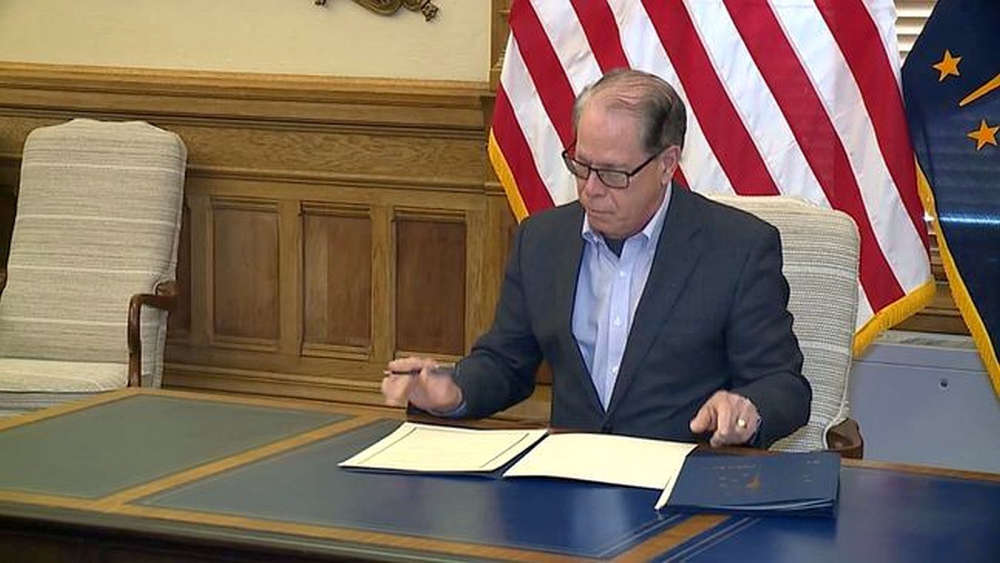
Governor Mike Braun today signed a landmark package of executive orders with initiatives to improve Indiana’s health and well-being. Secretary of Health and Human Services Robert F. Kennedy Jr. and Centers for Medicare and Medicaid Administrator Dr. Mehmet Oz were in attendance to support Indiana’s initiative.
Governor Braun released the following statement with the executive orders:
“Today, we’re taking bold action to Make Indiana Healthy Again and help Hoosiers live healthier lives.
“This isn’t the usual top-down, one-size-fits-all public health agenda: We’re focused on root causes, giving Hoosiers the transparent information to make decisions affecting their health, making it easier to access to fresh local food from Indiana’s incredible farms, and taking on the problems in government programs that are contributing to making our communities less healthy.
“We’re taking on big issues like preventative measures for diet-related chronic illnesses, addressing harmful additives in our food, encouraging fitness and health in schools through two new initiatives, and making big changes to food stamps to put the focus back on nutrition - not candy and soft drinks.”
“We’re also focused on the health of Indiana’s biggest budget line item and biggest health program - Medicaid - by making sure that enrollees don’t exceed the income requirements for the program.
“Today’s nine executive orders reflect a new approach to health policy in the state of Indiana focused on empowering everyone to live healthier, longer lives. Let’s Make Indiana Healthy Again!”
Robert F. Kennedy Jr., Secretary of Health and Human Services, attended the event in support of Indiana’s initiative.
“Thank you, Governor Braun, for your courageous and visionary leadership to Make Indiana Healthy Again,” said U.S. Department of Health and Human Services Secretary Robert F. Kennedy, Jr. “I urge every governor across America to follow your lead by signing similar executive orders in their states to improve nutrition standards in SNAP, increase transparency around food dyes and additives, implement physical fitness tests in schools, expand farm-to-school programs, and embrace the full scope of your transformative health agenda. Together, we can Make America Healthy Again.”
Dr. Mehmet Oz, Medicare and Medicaid Administrator, also attended the event in support.
“We’re delighted to work with our state and local partners—who are critical to advancing the Make America Healthy Again agenda,” said Centers for Medicare & Medicaid Services Administrator Dr. Oz. “By prioritizing prevention, proper nutrition, and healthy lifestyle choices, we can set our younger generations up for a lifetime of success.”
The first executive order overhauls work requirements for SNAP, so able-bodied SNAP recipients who are not working can be put on the path to filling one of Indiana’s 100,000+ open jobs that require no prior experience or a college degree.
The second cuts down on fraud and abuse of the SNAP program by reinstating income and asset verification to ensure that this program is being used only by those who really need it.
The third aims to change federal rules so states are incentivized to operate high-quality, entrepreneurial SNAP programs that put enrollees on a meaningful path to self-sufficiency.
The fourth executive order removes candy and soft drinks from SNAP benefits so that taxpayer funds are helping low income Americans afford nutritious food, not junk. The Governor’s office has been working with USDA’s Food and Nutrition Service and will be filing this waiver today. Indiana is among the first to take up HHS Secretary Kennedy’s call for states to file such waivers with this administration.
The fifth addresses Hoosier parents’ concerns with the possible negative effects of food dyes and increasing food transparency. We should know exactly what ingredients are in our food so we can opt for choices with fewer artificial ingredients.
The sixth kicks off a comprehensive study of diet-related chronic illness with a goal of empowering Hoosiers to address the root causes of chronic illness through preventative, evidence-based interventions such as nutrition, physical activity, early screening, and disease management.
The seventh aims to increase access to direct-to-consumer food from local Indiana farms.
The eighth establishes the Governor’s Fitness Test and School Fitness Month to encourage Indiana’s schools to give Hoosier kids every advantage possible to reach their full potential and lead healthy lives.
And the final aims to cut down on eligibility errors in the Medicaid program, after it was found that 28% of Indiana’s Medicaid spending - our largest budget line item - was improper spending, mostly due to eligibility errors. CMS Administrator Oz has been a leader on cracking down on abuse of the Medicaid presumptive eligibility process, and Indiana is following his lead.
Senate Bill 2 will follow these executive orders to the Governor’s desk this week, which includes work requirements for the Healthy Indiana Plan. The Governor’s office collaborated with the General Assembly on making these reforms to fix Medicaid.
Executive Order 25-52: Promoting Long-Term Growth and Flourishing for Hoosiers on the Supplemental Nutrition Assistance Program by Workforce Encouragement
Indiana seeks to help our neighbors who have fallen on hard times with their pressing needs, while also encouraging and investing in their long term self-sufficiency so that they can thrive and benefit our communities.
Two-thirds of able-bodied SNAP recipients are not working, many due to an exemption for those with dependent children in the home or are between the ages of 55-59.
Indiana currently has 138,000 open jobs — the vast majority of them require no prior experience, and 3/4 of them don’t require a college degree.
Under this executive order, the FSSA will overhaul its underutilized Employment and Training program to assign all non-exempt SNAP recipients to work requirements.
Executive Order 25-53: Increasing State Accountability Through Supplemental Nutrition Assistance Program Asset Verification
Indiana’s SNAP program had an improper payment rate of 10.46% in FY 2023, driven in part by insufficient verification of income eligibility.
To protect taxpayer money and safeguard this program for Hoosiers that really need it, we need to fix this issue.
The order reinstates asset testing for SNAP eligibility and limits eligibility to households receiving Temporary Assistance for Needy Family (“TANF”)-funded cash assistance, work supports, childcare assistance, or households participating in TANF-funded work, education, or training programs.
Executive Order 25-54: Informing Federal Lawmakers on Enabling Entrepreneurial Administration of Supplemental Nutrition Assistance Program Benefits by the States
SNAP's federal rules hinder innovation despite states covering half of the administrative costs and being better positioned to reduce improper payments and promote self-sufficiency.
States should be incentivized to operate high-quality, entrepreneurial SNAP programs that put enrollees on a meaningful path to self-sufficiency.
Under this executive order, the FSSA and the State Budget Agency will review federal SNAP statutes and report findings to federal officials by December 31, 2025, advocating for more state flexibility.
Executive Order 25-55: Making Indiana Healthy Again by Enhancing Nutrition in the Supplemental Nutrition Assistance Program
The stated purpose of the Supplemental Nutrition Assistance Program is to supplement lower-income Americans’ food budget so they can afford “nutritious food essential to health and well-being.”
Indiana shares that goal. In practice, the program is doing the opposite.
Soda is the number one commodity purchased with SNAP benefits.
Purchases of sugary drinks, desserts, and candy exceed the combined sales of fruits and vegetables on SNAP.
Children enrolled in SNAP consume 43% more sugary drinks than non-recipients with similar incomes.
Taxpayers fund this program with an intention of helping lower income Americans meet healthy nutrition requirements, not purchase candy and soft drinks.
Under this executive order, the Family and Social Services Administration will apply for a waiver to exclude candy and soft drinks from SNAP eligible products. If granted, the Secretary will eliminate those products from the list of SNAP eligible products in Indiana.
The Secretary of Health and Family Services will also recommend additional items to be removed from the SNAP eligible list commonly understood to have low nutritional value and a positive correlation with weight gain and obesity and obesity-related diseases such as heart disease, type 2 diabetes, and hypertension.
Executive Order 25-56: Making Indiana Healthy Again by Increasing Consumer Transparency Related to Food Dyes and Additives
Scientific research has indicated potential adverse health effects associated with certain artificial food dyes.
The FDA recently revoked the authorization for FD&C Red No. 3.
Some food dyes can trigger allergic reactions in some individuals, and Hoosier parents have expressed growing concern with limiting their kids’ exposure to these food additives.
Hoosier parents want more food transparency. We should know exactly what ingredients are in our food so we can opt for choices with fewer artificial ingredients.
Governor Braun shares these concerns, and is taking proactive measures to assess and address potential health concerns related to artificial food dyes and additives.
Under this executive order, the Indiana Department of Health will conduct a comprehensive assessment on the health impacts of artificial food dyes and additives, prioritizing those which have been identified by the federal government or other states to be harmful.
This assessment will look at the relevant scientific research, health risks, and advice from food safety specialists and consumer advocates.
At the end of the assessment, recommendations for state action will be made to the Governor.
Executive Order 25-57: Making Indiana Healthy Again by Developing a Comprehensive Diet-Related Chronic Disease Plan
The State of Indiana is committed to helping Hoosiers improve their health and well-being.
Six in ten Americans have a chronic disease, and just under half of Hoosiers are struggling with obesity, raising risks of chronic diseases like type 2 diabetes and heart disease.
Indiana wants to promote addressing the root causes of chronic disease with preventative, evidence-based interventions such as nutrition, physical activity, early screening, and disease management.
Under this executive order, the Secretary of Health and Family Services will conduct a comprehensive study on diet-related chronic disease in Indiana, especially among Hoosier kids, and how state programs designed to address diet-related chronic disease can be improved.
This study will analyze the current state of obesity and diet-related chronic disease in Indiana, existing state programs related to physical activity, nutrition, and chronic disease management, the budgets of those programs and how effective they are at reducing the incidence of chronic disease, and opportunities to improve these programs to get better return-on-investment, fill gaps in services, and reduce regulatory barriers.
Executive Order 25-58: Making Indiana Healthy Again by Increasing Hoosier Access to Local Foods
Nearly 2,735 Indiana farms sell $45 million worth of food directly to consumers, yet many face regulatory and infrastructure barriers.
Locally grown produce provides consumers with fresh and nutritious options that require shorter transportation and offer a local connection to farmers.
Increasing awareness, availability and access to Indiana’s rich heritage of local fruits, vegetables, meats, and dairy not only provides nutritious food sources for Hoosiers but further strengthens Indiana agriculture as the backbone of our State’s economy.
Under this executive order, the Indiana State Department of Agriculture will conduct a comprehensive study related to Hoosiers’ access to local foods and direct-to-consumer food sales from Hoosier farmers.
The purpose of this study is to identify opportunities to increase local direct-to-consumer sales and identify ways that the state is getting in the way.
Executive Order 25-59: Making Indiana Healthy Again by Promoting the Health and Wellness of Hoosier Students
Governor Braun wants Indiana’s schools to give Hoosier kids every advantage possible to reach their full potential and lead healthy lives.
This executive order establishes the Governor’s Fitness Test, with a reward program for students who demonstrate excellent performance on the fitness test.
It also establishes School Fitness Month with recommended activities and lessons that may be incorporated into the school day to increase students’ physical activity and health awareness.
It encourages healthier, local food options by increasing farm-to-school programs.
It provides parents with transparent and easily understandable nutritional data for all school meals in an electric format.
And it establishes an award for schools leading the way in student health.
Executive Order 25-60: Assuring Prudent Use of Taxpayer Funds by Ensuring Integrity in the Indiana Medicaid Program
Medicaid is Indiana’s largest budget line item.
Indiana Medicaid experienced a $1 billion budget shortfall in 2024 and had a 28.8% improper payment rate in the most recent federal audit.
For three years during COVID, Indiana enrolled individuals in Medicaid based on self-reported income information.
Over 80% of Medicaid enrollees in the State of Indiana had their Medicaid coverage renewed automatically without any action or verification from enrollees, far above the national average.
To protect this program long term for the Hoosier that need it most, action must be taken to ensure Medicaid enrollees meet requirements.
In the most recent analysis, 28% of Indiana’s Medicaid spending was improper payments, with eligibility errors accounting for two thirds of those improper payment.
Under this executive order, the FSSA must stop accepting self-attested eligibility, enforce hospital performance standards for presumptive eligibility, and use interagency data to identify ineligible recipients and initiate redeterminations.


 19 year old arrested for battery to a Prairie View Group Home employee
19 year old arrested for battery to a Prairie View Group Home employee
 March 2025 Marshall County Jail and Sheriff's Department reports
March 2025 Marshall County Jail and Sheriff's Department reports
 INDOT crews deploy to Michigan to assist with ice storm cleanup
INDOT crews deploy to Michigan to assist with ice storm cleanup
 Indiana Treasurer salutes 911 dispatchers in honor of National Public Safety Telecommunicators Week
Indiana Treasurer salutes 911 dispatchers in honor of National Public Safety Telecommunicators Week
 County BZA tables request for storage units on former Try Way Golf Course property
County BZA tables request for storage units on former Try Way Golf Course property
 Mother attains month-long proclamation in honor of son killed in work zone
Mother attains month-long proclamation in honor of son killed in work zone
 Woman arrested by county police for OWI
Woman arrested by county police for OWI
 County police arrest Decatur woman for driving with suspended license
County police arrest Decatur woman for driving with suspended license




